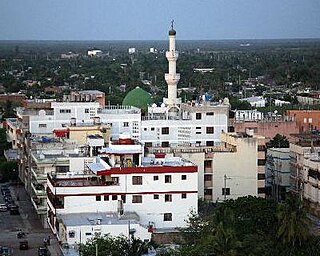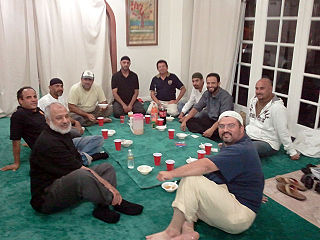This is a list of notable mosques and Islamic centres in the Americas, meaning individual buildings and congregations and administration, including notable current and former examples. This list is sorted alphabetically by country and building name.
This is a list of notable mosques and Islamic centres in the Americas, meaning individual buildings and congregations and administration, including notable current and former examples. This list is sorted alphabetically by country and building name.

Maicao is a city and municipality in the Department of La Guajira, northern Republic of Colombia. It is located 76 km from Riohacha, the capital of the department and is the second largest urban center near the border with Venezuela, after the city of Cúcuta.

El Salvador is a predominantly Christian country, with adherents Islam being a minuscule minority. Due to the secular nature of the country's constitution, Muslims are free to proselytize and build places of worship in the country.

Guatemala is a predominantly Christian country, with Islam being a small minority religion. Due to secular nature of the Guatemala's constitution, Muslims are free to proselytize and build places of worship in the country.

Islam in the Dominican Republic is a minority religion. Accurate statistics of religious affiliation are difficult to calculate and there is a wide variation concerning the actual numerical amount. Although the majority of the population is Christian, Muslims have formed local organizations such as the Círculo Islámico de República Dominicana and the Islamic Center of the Dominican Republic. Currently, the Círculo Islámico estimates that Muslims number over 4,000, including of a good number of local converts. Most recently, there has been another organization, led by native born Muslim converts, the Entidad Islámica Dominicana or EID.

In 2007, there were over 5,000 Muslims residing in Puerto Rico, representing about 0.1% of the population. The early Muslim community largely consisted mainly of Palestinian and Jordanian immigrants who arrived between 1958 and 1962. At the time, the vast majority of Puerto Rico's Muslims lived in Caguas – a city in the island's central region located south of San Juan – where they operated restaurants, jewelry stores and clothing outlets. A storefront mosque on Calle Padre Colón in the Río Piedras district of San Juan served the entire religious community on the island during earlier years, however, today there are mosques and Islamic centers in Aguadilla, Arecibo, Hatillo, Ponce, Vega Alta, and San Juan. The American Muslim Association of North America (AMANA) also has an office in Cayey.

Mexico is a predominantly Christian country, with adherents of Islam representing a small minority. Due to the secular nature of the state established by Mexico's constitution, Muslims are free to proselytize and build places of worship in the country. The country has a population of around 126 million as of 2020 census and according to the Pew Research Center, the Muslim population was 60,000 in 1980, 111,000 in 2010, and is predicted to be 126,000 in 2030; however, according to the 2010 National Institute of Statistics and Geography (INEGI) census, there were only 2,500 individuals who identified Islam as their religion. Most Muslims are foreign nationals and the majority are Sunni.

Venezuela is a predominantly Christian country, with Islam being a minority religion. There are approximately 100,000 Muslims in Venezuela which make up 0.4 percent of the nation's population. Venezuela has a small but influential Muslim population. Many of them are Arabs of Lebanese, Palestinian, Syrian and Turkish descent.

Honduras is a predominantly Christian country, with Islam being a small minority religion. Due to secular nature of the country's constitution, Muslims are free to proselytize and build places of worship in the country. The statistics for Islam in Honduras estimate a total Muslim population of 11,000 representing 0.1 percent of the population.

Chile is a predominantly Christian country, with adherents of Islam being a minuscule minority. Due to the secular nature of Chile's constitution, Muslims are free to proselytize and build places of worship in the country. The statistics for Islam in Chile estimate a total Muslim population of approximately 5,000, representing less than 0.02% of the population. There are a number of Islamic organizations in Chile, including the Muslim Society of Chile and As-Salam Mosque in Santiago, Bilal Mosque in Iquique, the Mohammed VI Cultural Center in Coquimbo, and Islamic Foundation of Chile in Santiago.

The Islamic Cultural Center "Custodian of the Two Holy Mosques King Fahd in Argentina" is a mosque and center for Islamic culture located in Buenos Aires, Argentina. It is named after King Fahd of Saudi Arabia.

Lists of mosques cover mosques, places of worship for Muslims. The lists include the most famous, largest and oldest mosques, and mosques mentioned in the Quran, as well as lists of mosques in each region and country of the world. The major regions, Africa, Americas, Asia, Europe and Oceania are sorted alphabetically. The sub-regions, such as Northeast and Northwest Africa in Africa, and Arabia and South Asia in Asia, are sorted by the dates in which their first mosques were reportedly established, more or less, barring those that are mentioned by name in the Quran.

The Macau Mosque and Cemetery is the only mosque and Muslim cemetery in Macau, China, located in the parish of Nossa Senhora de Fátima.

The Al Ahmad Mosque is an Islamic place of worship in Buenos Aires, Argentina, opened in 1985. It is the second oldest mosque in Buenos Aires but it is the oldest building with Islamic architecture in Argentina and it was designed by Ahmed and Elia Ham.
Abdul Karim Paz is an Argentine Shi'i sheikh, head imam of the At-Tauhid mosque in the Floresta neighbourhood. He is known for holding pro-Iran views on AMIA bombing case. Paz serves also as a representative of Organización Islámica Argentina.
Malabo Mosque also known as Malabo Central Mosque is a mosque in Malabo, Equatorial Guinea. It is the largest mosque in Equatorial Guinea and can accommodate two thousand people.
{{cite web}}: CS1 maint: archived copy as title (link)